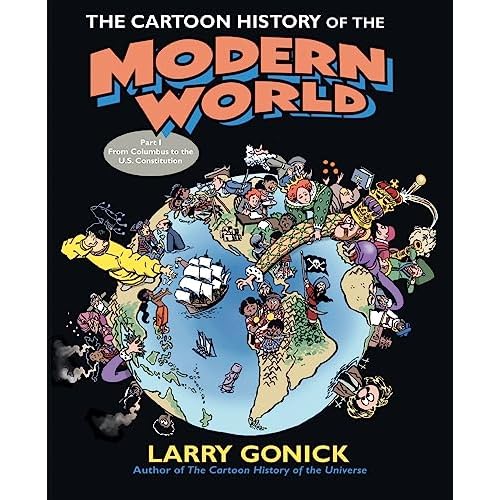Of historical proportions. Or hysterical.
 Seven years ago, my daughter told me a story about this creepy old king she'd read about, whose name she couldn't pronounce. After a few minutes, I figured out the one she was talking about. Wait, I said, that's Tiberius Caesar.
Seven years ago, my daughter told me a story about this creepy old king she'd read about, whose name she couldn't pronounce. After a few minutes, I figured out the one she was talking about. Wait, I said, that's Tiberius Caesar.
Not a bad conversation for a parent to have with a 9-year-old. Suzanna owes a lot of her whiz-kid abilities in history to Larrry Gonick and his Cartoon Histories of the Universe. Mr. Gonick has released his latest volume, The Cartoon History of the Modern World, Part 1: From Columbus to the U. S. Constitution, and it sustains the high standards set by his previous works: funny, learned, engaging, skeptical.
If you find anything labeled "cartoon history" difficult to take seriously as an adult, you're mistaken. Mr. Gonick's books are marvelous instruments of instruction and entertainment -- and they're just really smart history books, too. I cannot over-recommend them to parents of school-age kids, especially kids who are book-phobic or at least schoolbook-phobic (meaning, mostly, young boys). Parents, in the first place, should consider enticing such children into reading by letting them read comic books. Reading is reading; just get them started. My siblings and I subscribed to seven different titles back in Marvel Comics' great age of Spiderman, the X-Men, the Fantastic Four and the Silver Surfer, and the only ill-effects we've suffered come from seeing the prices our old (now lost) collection would currently fetch on the market. Besides, the earlier Cartoon Histories of the Universe dealt with all of that Biblical slaughter and illicit sex, so that should certainly interest 10-year-old boys.
But beyond the obvious kid-appeal of the Cartoon Histories, they really are a pleasure to read -- from Mr. Gonick's draftmanship to his research. In those areas of history I know something about, it's amazing to see how shrewdly Mr. Gonick has compressed entire arguments. This time, it's the global reach, the simultaneity of events that's fascinating -- like some giant, moving jigsaw puzzle. I knew, for example, that the Turks' invasion of Europe in the 15th century had influenced the wars of the Reformation and Counter-Reformation. I hadn't realized how often it happened and how much the early life of Protestantism owes to those military distractions and the death of Charles V. Events could have easily been timed differently, and although it's not likely the Reformation could have been forced back into the bottle, the bloodshed might have toppled different kingdoms, affected colonial growth in different ways.
Through his balding, comic-professor narrator, Mr. Gonick conveys his own values (tolerance, clarity of thought, amusement at human folly) without clouding events. The only villains he finds are the bloodthirsty fanatics, and even then, he's often willing to grant them the efficacy of their methods. He's perfectly willing to pause the March of History to sketch in background or spend time in a footnote on the kind of wonderful detail that enlivens all that marching (how the 16th-century Venetian traveller Lodovico Varthema, for example -- the first non-Muslim known to have entered Mecca -- managed to escape a Yemen jail).
My one gripe about his books: It's easy enough to complain about the lack of this or that figure. Mr. Gonick has to cover so much ground, much of his wisdom resides in the editing, what he has to trim or mention only in passing. But overall, his histories are histories of Big Ideas and Big Events -- meaning he covers politics, religion, the military and science (both technology and theory). But not as much on culture. Occasionally, important writers will pop up, notably Shakespeare and Cervantes, and even the rare artist or architect (Michelangelo). But the other arts are mostly absent -- especially music. No Bach, no Mozart, no opera.
Mr. Gonick's subject this time, "the modern world," means mostly "the New World and Europe's growth and expansion into it" -- but that doesn't mean his books are heavily Euro-centric. Far from it. There's plenty here, for instance, on the establishment of the Sikh religion or the pre-Columbian cultures. It's just that given the explosion caused by capitalism, colonialism, technology and religious competition, the West tended to be where so much of the turmoil was. The West, for better AND worse, pretty much created "the modern," and whether that means the invention of telescope-aided astronomy or the slaughter of native peoples, Mr. Gonick manages to be a wonderful guide, both serious and light-hearted.
Categories:
Blogroll
Critical Mass (National Book Critics Circle blog)
Acephalous
Again With the Comics
Bookbitch
Bookdwarf
Bookforum
BookFox
Booklust
Bookninja
Books, Inq.
Bookslut
Booktrade
Book World
Brit Lit Blogs
Buzz, Balls & Hype
Conversational Reading
Critical Compendium
Crooked Timber
The Elegant Variation
Flyover
GalleyCat
Grumpy Old Bookman
Hermenautic Circle
The High Hat
Intellectual Affairs
Jon Swift
Laila Lalami
Lenin's Tomb
Light Reading
The Litblog Co-op
The Literary Saloon
LitMinds
MetaxuCafe
The Millions
Old Hag
The Phil Nugent Experience
Pinakothek
Powell's
Publishing Insider
The Quarterly Conversation
Quick Study (Scott McLemee)
Reading
Experience
Sentences
The Valve
Thrillers:
Confessions of an Idiosyncratic Mind
Crime Fiction Dossier
Detectives Beyond Borders
Mystery Ink
The Rap Sheet
Print Media:
Boston Globe Books
Chicago Tribune Books
The Chronicle Review
The Dallas Morning News
The Literary Review/UK
London Review of Books
Times Literary Supplement
San Francisco Chronicle Books
Voice Literary Supplement
Washington Post Book World

1 Comments